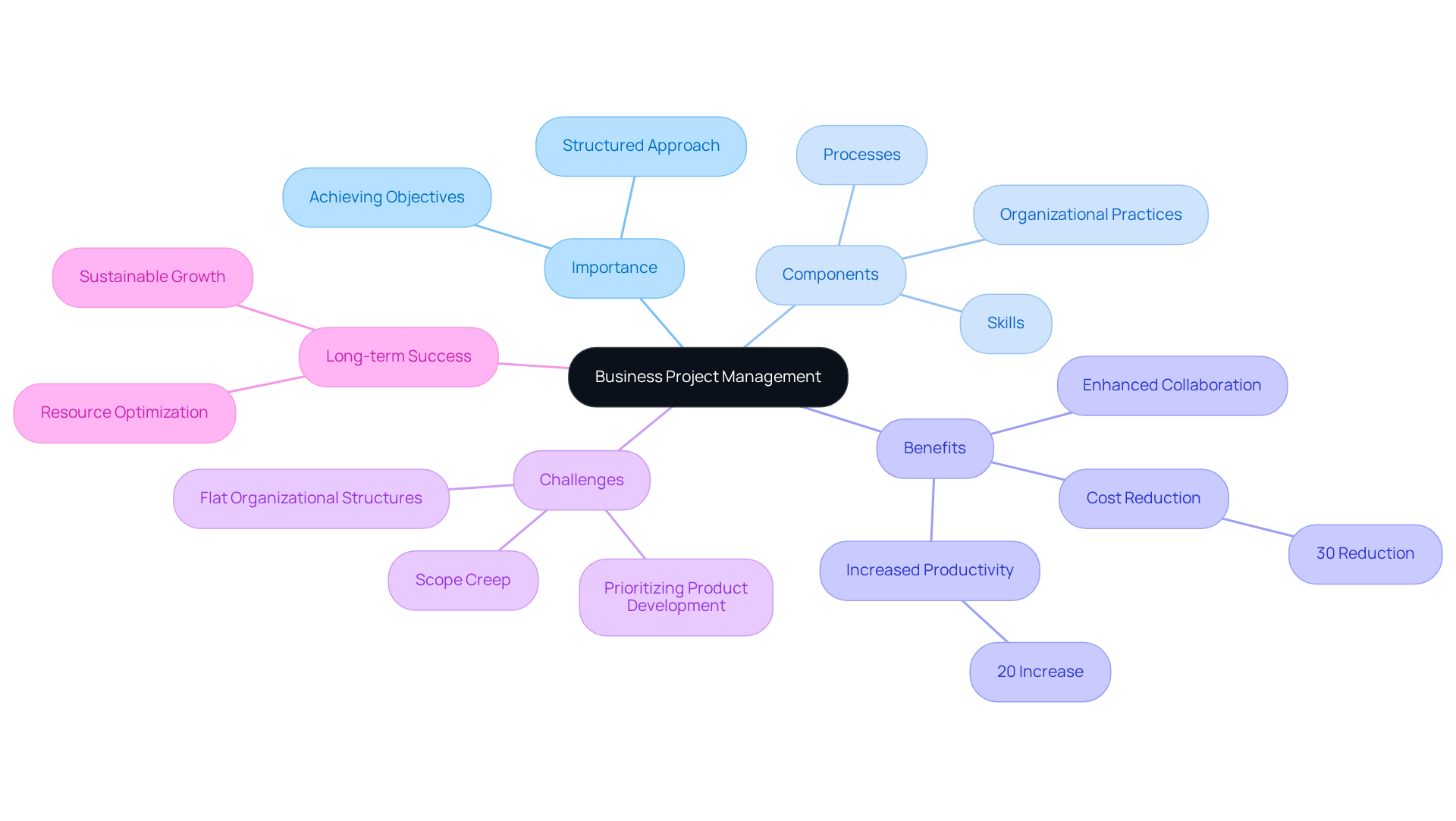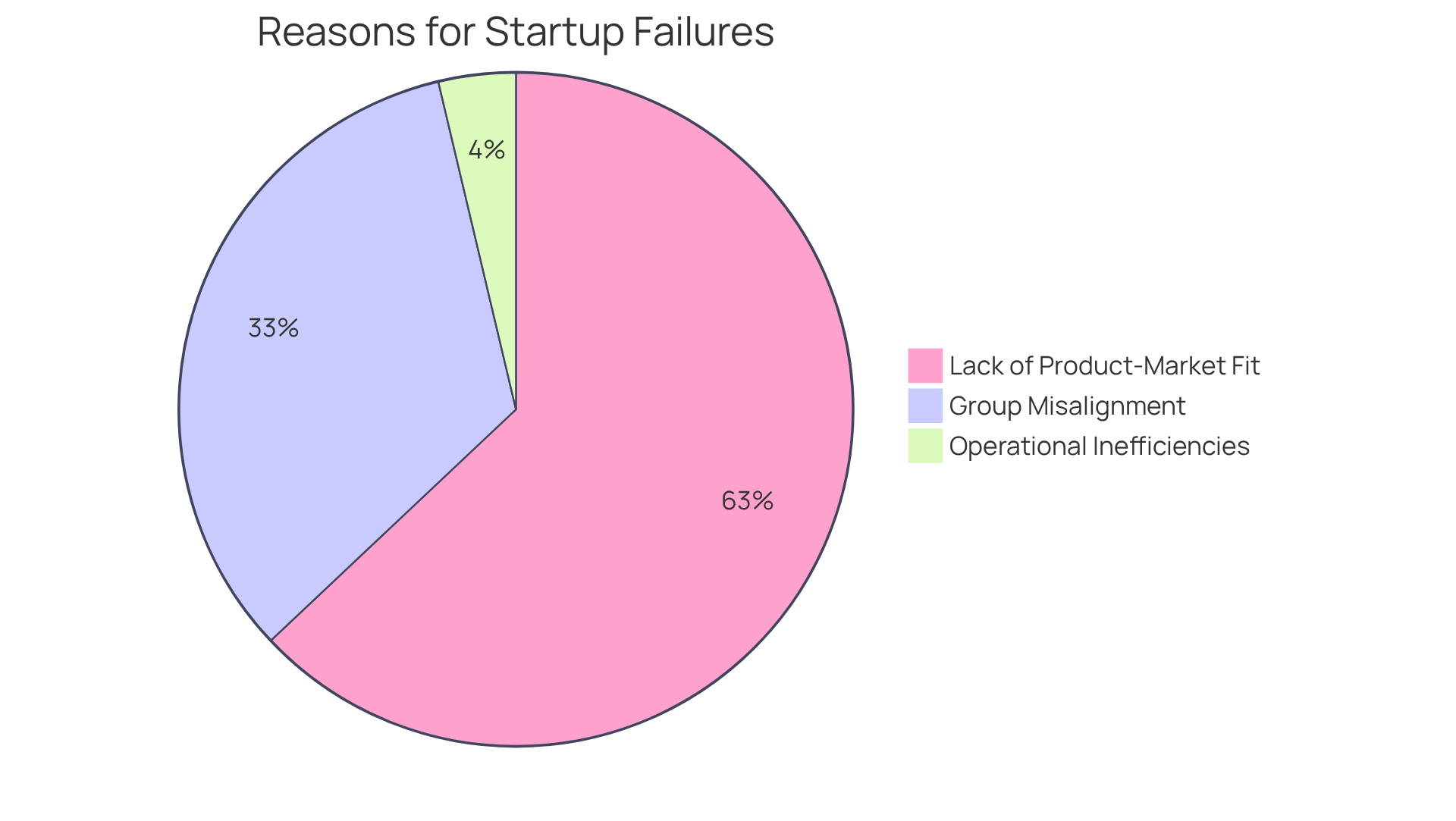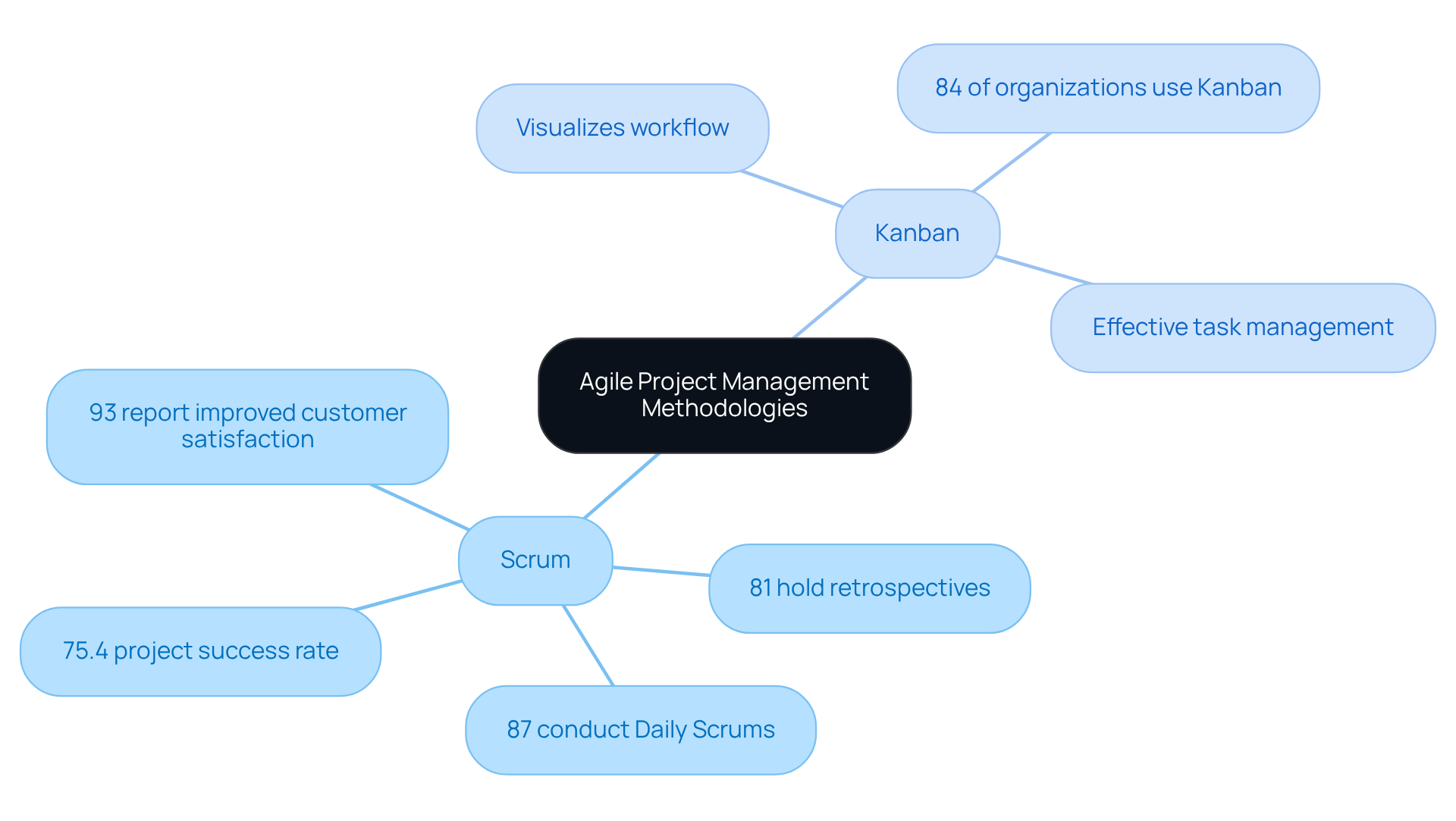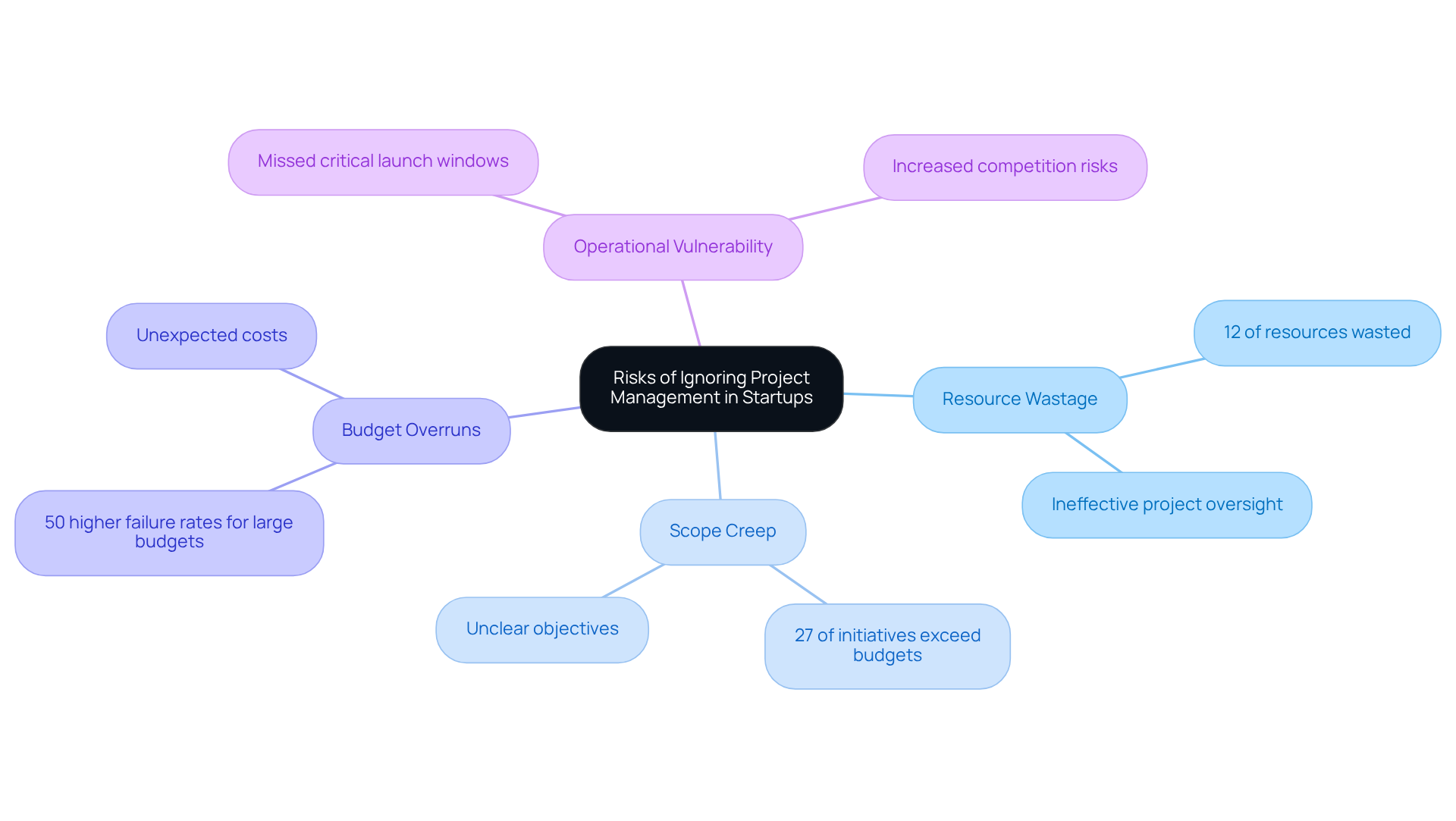Overview
Business project management is essential for startup success. It provides a structured approach to planning, executing, and overseeing initiatives. This ensures projects are completed on time, within budget, and to quality standards. Effective project management enhances operational efficiency, improves team collaboration, and mitigates risks associated with unclear objectives and resource wastage. Ultimately, it fosters long-term growth and sustainability for new ventures.
Have you considered how project management can transform your startup? By implementing these practices, you can navigate the complexities of launching a new business with greater ease. The advantages are clear: a well-managed project not only meets deadlines but also aligns with your strategic vision. This alignment is crucial in today’s competitive landscape.
Moreover, the structured nature of project management allows for adaptability, enabling teams to respond swiftly to changes and challenges. As you reflect on your startup’s journey, think about the potential improvements in collaboration and efficiency that effective project management can bring. Embrace this approach, and watch your venture thrive.
Introduction
Business project management is the backbone for startups navigating the tumultuous waters of entrepreneurship. By employing structured methodologies, new ventures can streamline their processes, enhance collaboration, and ultimately drive sustainable growth.
However, many startups grapple with the dual challenge of innovation and operational efficiency, often leading to missed opportunities and costly mistakes.
How can these emerging businesses harness effective project management to not only survive but thrive in a competitive landscape?
Define Business Project Management and Its Importance
Business project management involves overseeing initiatives by leveraging processes, methods, skills, knowledge, and experience to achieve specific objectives within a business context. This is particularly vital for startups, as it provides a systematic approach to planning, executing, and overseeing initiatives. Effective oversight ensures that projects are completed on time, within budget, and to the expected quality standards. This organized methodology not only supports immediate goals but also aligns with broader business project management strategies, fostering long-term growth and sustainability.
By implementing robust organizational practices, new businesses can enhance operational efficiency, improve team collaboration, and ultimately drive better business outcomes. For instance, studies indicate that effective task coordination can lead to a 20% increase in productivity and a 30% reduction in costs, underscoring its importance in the entrepreneurial landscape. However, startups often face challenges, such as prioritizing product development over process and adopting flat organizational structures that complicate role assignments.
How can clear communication and defined roles within organizational frameworks enhance transparency and accountability? These elements are crucial for building trust with clients and investors. Additionally, the ability to adapt and remain flexible is essential for startups to respond to changing objectives and strategies. In conclusion, structured business project management is not merely a tool for task completion; it is a strategic asset that empowers new businesses to navigate challenges, optimize resources, and achieve sustainable success.

Identify Startup Challenges That Necessitate Project Management
Startups face a myriad of challenges that can significantly hinder their growth and success, such as limited resources, fierce competition, and the urgent need for rapid innovation. Typically, these businesses operate with small teams, where each member juggles multiple roles. This can lead to role confusion and inefficiencies. The dynamic nature of new ventures often results in shifting priorities, complicating the focus on long-term objectives. Without a systematic approach to business project management, new businesses risk task overload, miscommunication, and missed deadlines.
Consider this: a startup may have an innovative product concept yet struggle with implementation due to insufficient coordination. Research indicates that:
- 34% of new ventures fail due to a lack of product-market fit, often stemming from poor execution and coordination.
- 18% of new ventures collapse due to group misalignment, underscoring the critical role of initiative oversight in coordinating team efforts.
By adopting robust business project management practices, new ventures can adeptly navigate these challenges, ensuring that all team members are aligned and working collaboratively towards shared objectives. This alignment is crucial, as operational inefficiencies and a lack of structure account for 2% of new business failures, highlighting the pressing need for effective solution strategies.

Explore Project Management Methodologies That Enhance Startup Success
Implementing efficient initiative oversight techniques is vital for business project management success, particularly in today’s rapid business landscape. Agile business project management, with its emphasis on flexibility and iterative progress, empowers startups to swiftly adapt to changing market conditions. Within Agile, Scrum stands out by delivering work in short cycles, enabling teams to frequently evaluate progress and make necessary adjustments. This approach not only enhances responsiveness but also fosters a culture of collaboration and continuous improvement—essential elements for innovation.
Statistics reveal that:
- 87% of Scrum groups conduct Daily Scrum meetings, significantly enhancing communication and coordination.
- 81% of Scrum teams report holding a retrospective after every sprint, underscoring the importance of regular team assessments in Agile practices.
- Organizations employing Agile methodologies boast a project success rate of 75.4%, while 93% of Agile organizations report improved customer satisfaction.
This highlights the broader impact of these methodologies in driving results. For new businesses, this signifies the capacity to adjust product attributes based on user input, ensuring alignment with customer requirements.
Kanban, another Agile methodology, visualizes workflow, assisting teams in managing tasks efficiently and prioritizing effectively. In fact, 84% of organizations utilize either Scrum or Kanban, showcasing the prevalence and acceptance of these methodologies in the industry. By integrating these practices into business project management, new ventures can streamline processes, enhance communication among team members, and ultimately deliver superior products to market more quickly. The cumulative benefits of Agile practices not only improve operational performance but also foster a sustainable competitive edge in a rapidly evolving landscape.
For those eager to explore Agile principles further, an upcoming webinar on March 13, 2025, will provide practical insights for new businesses. Additionally, tools like Casy can automate workflows and boost productivity, facilitating the effective implementation of Agile methodologies.

Analyze Risks of Ignoring Project Management in Startups
Ignoring organizational oversight exposes new businesses to significant dangers that jeopardize their sustainability. A lack of structured approaches in business project management often results in unclear objectives, which leads to wasted resources and time. Indeed, organizations squander 12% of resources due to ineffective business project management oversight, underscoring the detrimental impact on new venture resources. Poorly defined roles and responsibilities create confusion and conflict within teams, adversely affecting morale and productivity.
Furthermore, new ventures that bypass organizational practices frequently encounter scope creep, where initiatives exceed their initial objectives. This situation leads to budget excesses and missed timelines. Statistics reveal that 27% of initiatives surpass their original budgets because of unforeseen costs. Notably, in business project management, endeavors with budgets exceeding $1 million are 50% more prone to failure compared to those beneath $350,000, highlighting the financial consequences of inadequate oversight.
The absence of risk oversight leaves new businesses vulnerable to unexpected challenges, such as market changes or operational interruptions. For instance, a new business that fails to manage timelines effectively may miss critical launch windows, allowing competitors to seize market opportunities. By recognizing these risks, new ventures can appreciate the importance of business project management strategies to safeguard their operations and enhance their likelihood of success.
As noted by industry experts, '87% of senior managers understand the importance of business project management practices and methodologies,' emphasizing the critical role that effective project management plays in achieving startup success.

Conclusion
Structured business project management is essential for the success of startups, providing a framework that enables new ventures to navigate the complexities of launching and growing a business. By implementing effective project management practices, startups can enhance their operational efficiency, foster collaboration among team members, and ultimately achieve their strategic objectives.
This article highlights several key insights:
- The importance of clear communication and defined roles
- The necessity of adapting methodologies such as Agile and Scrum
- The significant risks associated with neglecting project management
Startups that embrace these practices can mitigate challenges like role confusion, scope creep, and resource wastage, thereby positioning themselves for sustainable growth and success in a competitive landscape.
In a world where the agility and responsiveness of a business can dictate its survival, adopting robust project management strategies is not just advisable; it is imperative. Startups must recognize that effective project management is a strategic asset that empowers them to align their efforts, optimize resources, and navigate the inevitable challenges of entrepreneurship. Embracing these methodologies can lead to improved outcomes, enhanced customer satisfaction, and ultimately, a greater chance of long-term success.
Frequently Asked Questions
What is business project management?
Business project management involves overseeing initiatives by utilizing processes, methods, skills, knowledge, and experience to achieve specific objectives within a business context.
Why is business project management important for startups?
It provides a systematic approach to planning, executing, and overseeing initiatives, ensuring projects are completed on time, within budget, and to expected quality standards, which is vital for the growth and sustainability of startups.
How does effective business project management impact operational efficiency?
By implementing robust organizational practices, new businesses can enhance operational efficiency, improve team collaboration, and drive better business outcomes, potentially leading to a 20% increase in productivity and a 30% reduction in costs.
What challenges do startups face in business project management?
Startups often prioritize product development over process and may adopt flat organizational structures that complicate role assignments.
How can clear communication and defined roles enhance transparency and accountability in a startup?
Clear communication and defined roles are crucial for building trust with clients and investors, enhancing transparency and accountability within the organization.
Why is adaptability important for startups in project management?
The ability to adapt and remain flexible is essential for startups to respond to changing objectives and strategies effectively.
What is the overall value of structured business project management for new businesses?
Structured business project management is a strategic asset that empowers businesses to navigate challenges, optimize resources, and achieve sustainable success.




